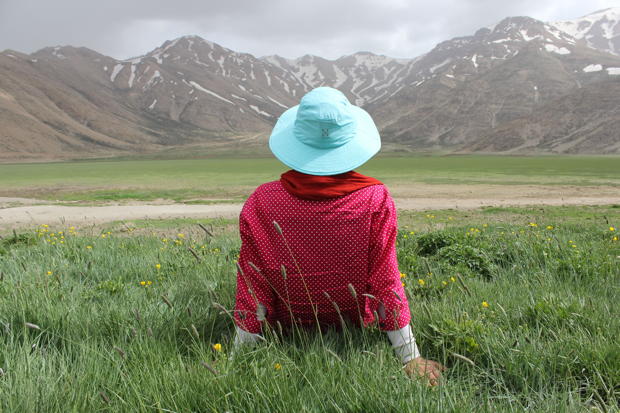
When I was growing up in a family of seven, the bathroom was the only place in the house where you could shut the door and not be bothered. I still associate bathrooms with precious privacy and quiet. I’m puzzled by people who like to carry on full conversations in the restroom.
Reading the book Quiet by Susan Cain helped me better understand why I feel this way. One point that clicked with me was the concept of being highly sensitive. As well as being an introvert, I relate to several traits of highly sensitive people, including a tendency to process things more than the average person. This means I might get more easily overwhelmed by stimulation such as noise, crowds, or surprises that don’t give me enough time and space to process what I’m experiencing.
Space and quiet are a refuge. I don’t like having people in my way, or worse, getting in someone else’s way.
The Untroubled Dream
Not all introverts or highly sensitive people have the same tendencies. But when I add to these traits my perfectionism, task-orientation, and love of being independent, I find I often get annoyed at other people and situations. Even more, I’m sensitive about causing annoyance or inconvenience for others. Before COVID-19 introduced us all to social distancing, I tried to avoid crowded places, such as my office kitchen during the lunch rush. Sometimes I keep walking instead of crossing at a crosswalk if there’s a car that will have to wait for me.
Occasionally in such situations a phrase comes to mind from one of my favorite poems, “I Am” by John Clare: “untroubling and untroubled.” This poem, after powerfully describing feelings of abandonment and inner turmoil, turns to longing for an idyllic world unsullied by humans, “there to abide with my Creator God.” I love the image of a blessed solitude, free not only from trouble but also from causing trouble for anyone else.
The problem with this desire is that I still live in this world. Here, wherever there are people, there is trouble. As John Clare knew, even in solitude I bring trouble with me. Clare articulates in “I Am” a need for peaceful freedom, but he also cries for healing in relationships—with God and with other people.
Safety and Good Trouble
Being around people is especially exhausting when you’re weighing physical safety and experiencing flux in your routines. The pandemic seemed to confirm a nagging fear that people are a risk. Just being near others became a threat to my physical safety, and worse, I became a threat to them.
Though I’m less worried about spreading viruses now, it can still feel safer to avoid risks and protect my space. Introverts know boundaries are essential. But in some cases, focusing on self-preservation can lead to spirals of loneliness, resentment, and self-centeredness. Like it or not, I have needs that sometimes require me to risk imposing on others. People of every personality need community and connection. Sometimes I need to ask others to trouble themselves to give me a ride, go to an event with me, or help me think through a decision.
What’s more, my personality does not excuse me from taking risks in reaching out to others. Like all introverts, I have gifts and capacities that enrich the world. To live well, we need to engage the troublesomeness around us — as safely as possible.
Recently I listened to a podcast where counselor and author K. J. Ramsey described how each of us has a natural need for safety. This simple idea was affirming for me. In both the church and the broader culture I’ve been told many times that I must take risks and get outside my comfort zone. But it’s not inherently wrong to crave security; that’s how God designed us. Our bodies are always scanning for danger so that we can avoid getting hurt.
It is a problem, Ramsey said, when we get into patterns of hypervigilance, focusing on the negatives around us. This happens when I magnify risks because of my personality or past experiences. When we become more aware of these dynamics, we can practice focusing on goodness and cuing feelings of safety even in uncertain situations.
For example, the idea of going to a friend’s party might make me feel overwhelmed, and I think about potential downsides. But if I know my patterns and consider the good that can come out of going, I might decide it’s worth the trouble. Maybe it won’t be troubling at all.
Sharing Space
My friend Caryn is great at reaching out to people. When she went through a difficult season a few years ago, she started texting me more often and asking to get together. Sometimes she plans events months in advance, and sometimes she spontaneously invites me to lunch. Looking back, I’m grateful for how she has encouraged me with her presence. I thought at first that I was being kind to her in her needs, but her initiative has made a huge difference in my own loneliness, including through the entire pandemic.
Caryn reminds me that I really do need to be near people, and it’s okay to express my needs even when I imagine it will be inconvenient for others. It may stretch me or surprise me at times, but it can also be natural and life giving.
I will always treasure the image of spacious solitude, and I will seek it out often. But I can’t stay there. I can’t hide in the bathroom too long. After all, the refuge I have with my Creator God comes along wherever I go and whatever I face. To love people is to be troubled, in ways large and small, and to find grace in the trouble.
Photo by Mohammad Bagher Adib Behrooz on StockSnap